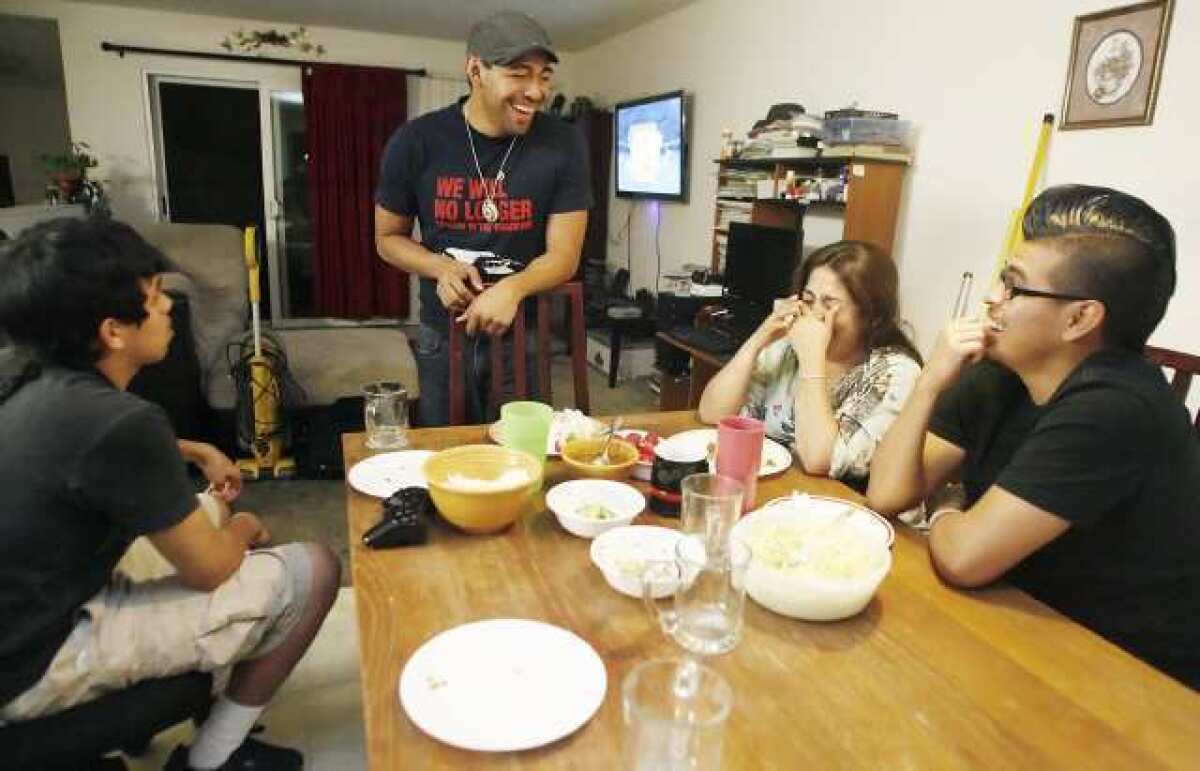Family fights to be recognized

- Share via
Pasadena City College student Isaac Barrera sat in the dining room of his family’s Boyle Heights apartment, asking his youngest brother Israel if he recalled what prompted immigration officials to detain Isaac and their brother Ruben last year.
“Why, Isra?” asked Isaac.
The 14-year-old then recounted how his brothers stormed into the Immigrations and Customs Enforcement office in downtown Los Angeles, and how an unmarked white van took them away. He knew they were “fighting for change,” he said, but he didn’t want them to risk deportation.
“They’re my brothers,” he said. “I can’t live without my brothers.”
The brothers have much in common — their home, high school and sense of humor — but Israel is the only one who is a legal resident of the United States.
The Barreras are among the 8.8 million people in the United States in mixed-status families — part legal U.S. resident, part undocumented immigrant — according to a 2009 Pew Hispanic Center study.
Many of these families got a welcome surprise this week when President Obama announced that federal authorities will stop deportations of qualified undocumented people who came here as youths. The shift is being decried by those who want the government to take a firmer stance on undocumented immigrants, and hailed by advocates seeking reform of immigration laws.
But the Barrera brothers may not benefit. Since Isaac, 22, and Ruben, 17, have been arrested, they may be barred from taking part in the program.
Isaac said he views the new policy as an election-year ploy by the president, while wide-ranging reform efforts stall in Washington, D.C.
“This is not the Dream Act, not a pathway for citizenship,” said Isaac, who has twice been arrested at protests. “I’m happy for the people who really need this, but a lot of people like my family are left out.”
Mixed-status families deal with a host of unusual issues, often felt most acutely within the walls of their own homes.
Some family members can drive legally, while others cannot. Some can apply for government jobs or benefits, while others cannot.
William Perez, a Claremont Graduate University psychology professor who has studied undocumented students, said about 4.5 million U.S.-born children are part of mixed-status families. He said many, like Isaac and Ruben Barrera, become politically active because of their own experience.
He also said siblings with legal status can develop a sense of guilt about those who don’t have it.
“In psychology we describe it as survivor’s guilt — ‘I’m on the other side, but all these people that I care about are still in legal limbo,’” Perez said. “There is also this inner conflict for undocumented youth, seeing their loved ones have a different set of opportunities than they had.”
If there’s any jealousy among the Barrera brothers, it’s not evident. The family makes a point to have dinner together during the week, and no one eats until everyone is there.
Isaac was 4, Ruben 1 and Israel not yet born when the family made its way from Mexicali to Tijuana, where a coyote whisked the Barreras across the border using borrowed birth certificates.
Israel is the sole member of his family to have a Social Security number. The Barreras were eligible for a low-income housing unit in Boyle Heights because of him, just one of the ways his status separates him from his brothers.
“I felt bad when they weren’t able to get a [driver’s] license,” Israel said in his room, moments after strumming Metallica and Red Hot Chili Peppers songs on his electric guitar. “It motivates me to do my best. I have these privileges, and I need to do a good job at everything.”
Israel’s report card is posted on the refrigerator, all A’s. He hopes to study architecture, and after a recent trip to UCLA he has his heart set on enrolling there.
This spring, Isaac and Ruben went to the baseball diamond at the Edward R. Roybal Learning Center in downtown L.A., where Israel plays for the Titans. With a postcard view of the downtown skyline beyond the field, Isaac and Ruben watched their brother make his way from second base to home.
“Isra is going to be a little bit more privileged than me,” Isaac said. “There were a lot of doors closed for me. Still, I’m happy that he’ll at least be able to apply to any college. I worry about Ruben all the time.”
Isaac organizes for chapters of the Immigrant Youth Coalition and one of the founders of the San Gabriel Valley Dream Team.
Luz Sanchez, the mother of the three boys, said she was scared when her older sons started to demonstrate. Would they be arrested? Deported? But now she joins them. Recently she was at a coming-out event at Mariachi Plaza in Los Angeles, smiling with a megaphone in hand and announcing that she, too, is undocumented.
“My hope is that something good will come out of the work my sons and others do,” Sanchez said. “It may be difficult at times, but the last thing that dies is hope.”